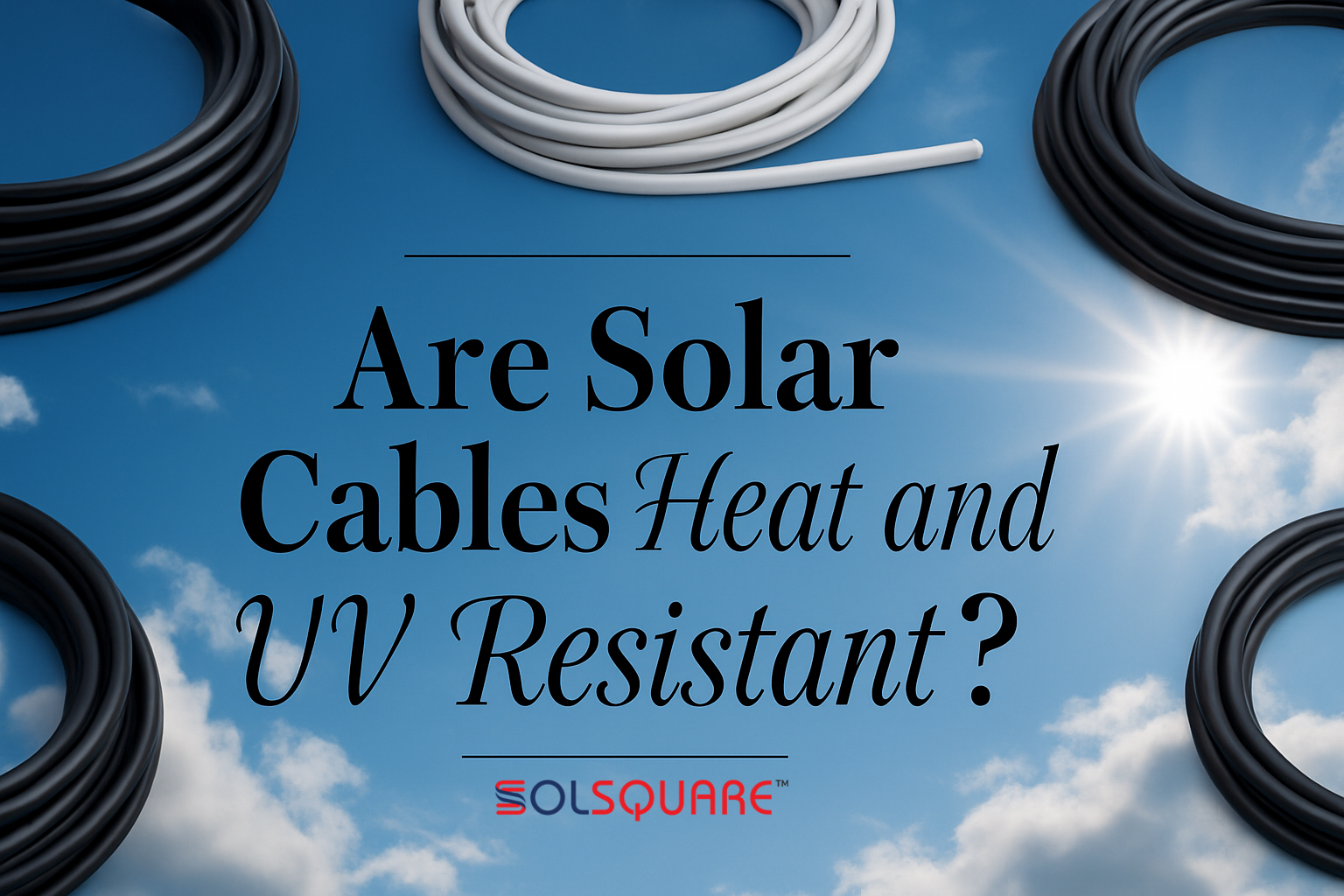Are Solar Cables Heat and UV Resistant?
A practical guide to cable durability and protection for your rooftop system

Are Solar Cables Heat and UV Resistant?
When one is thinking about solar energy, he or she mostly considers the solar panels and inverters. However, there exists the other vital component of any solar system which is usually forgotten the solar cables.
Such wires channel the electricity produced by your solar panels to your business or home. Most people wonder: since they are mostly under the harsh outdoor elements why not…
Are the solar cables heat and UV?
We might simplify it down then you will understand where to look and why.
Why It Matters: The Harsh Reality for Solar Cables
Most solar installations are done on rooftops or open areas. That means the cables are exposed to:
- Direct sunlight every day
- High temperatures in the summer
- Rain and moisture during monsoons
- Dust, wind, and physical movement
- Rodents and birds in some locations
If the cables aren't made for these conditions, they can crack, melt, or stop working — leading to safety issues or even power loss.
What Does Heat Resistance in Solar Cables Mean?
1. Temperature Ratings
Good solar cables are designed to handle very high temperatures. The insulation and inner materials can usually tolerate:
- Up to 90°C continuously
- Short term blasts at up to 120degrees C (as in mid-day extremes of heat)
This will guarantee that the cable does not melt or spoil even when it is being painted on a rooftop in the hot summer sun.
2. Materials Matter
Cables made with cross-linked polyethylene (XLPE) or EPR insulation offer great heat resistance. They don’t soften, crack, or catch fire easily.
What of UV resistance?
Sun rays are invisible UV rays which are potent. UV radiations may eventually obliterate plastics and rubber items. In case of cables that are not UV resistant:
- The outer layer may fade or crack
- Water can enter the cable
- The cable may short-circuit or become dangerous
How Do Solar Cables Resist UV?
- UV-Stabilized Jackets These are protective jackets that shield the effects of the UV on the insulation.
- Black Sheathing with Carbon Black: The majority of solar cables color is black to give an extra UV protection example: It is designed in such a way that when the solar cable is black, it has the natural protection against UV.
Why You Should Only Use Solar-Grade Cables
Not all cables are made for solar use. Some people mistakenly use regular wires for outdoor connections, but those are not safe for long-term rooftop exposure.
Here's what solar cables should have:
| Feature | Why It’s Important |
|---|---|
| Heat resistance | Prevents melting or deformation |
| UV resistance | Prevents cracking and outdoor damage |
| Flame retardant | Stops fire from spreading |
| Moisture resistance | Keeps the cable safe in rain or humidity |
| Long lifespan | Reduces need for frequent replacement |
A Trusted Example: Solsquare Solar Cables
If you visit Solsquare’s solar cable page, you’ll see their cables are built specifically for these tough outdoor conditions. They are:
- UV resistant
- Flame retardant
- Halogen-free
- Elastics and weatherproof
Solsquare has a policy of making their cables safe to be used on rooftops, open place or even underground and will have a lasting protection.
What Happens If You Use the Wrong Cable?
Using non-solar wires might save money in the short term, but they may:
- Crack within 1–2 years
- Reduce the efficiency of your system
- Cause electrical shorts or fire risks
- Require costly replacement and rework
That’s why choosing certified solar cables from reliable brands like Solsquare is a smart decision for long-term safety and performance.
Common Standards Solar Cables Should Meet
To ensure quality, check if your cable follows standards like:
- IEC 62930 (international PV cable standard)
- EN 50618 (European solar cable standard)
- TUV Certified (rigorous environmental testing)
- IS 694 (Indian standard for electrical wires)
Solsquare cables meet international standards and are tested for extreme Indian climates — from hot Rajasthan to humid Kerala.
Pro Tips for Cable Installation
- Use proper conduit or casing to avoid physical damage
- Don’t bend cables too tightly
- Keep AC and DC cables separate
- Label and organize wiring properly
- Inspect once a year for wear and tear
FAQs
Conclusion: Select the right cable to have a long term system
The solar energy has got a lot of promise as an investment, but not when any of the parts are not designed to last. That is including the cables, which have to last through decades of blistering heat, intense sunlight and rain.
The solution, therefore, to our initial query is easy:
Yes, solar cables are resistant to heat and UV - but not when using low-quality solar cables, which are not certified and which are not manufactured professionally by Solsquare.
Never gamble with less expensive substitutes. A good solid solar system begins by selecting the proper cable.